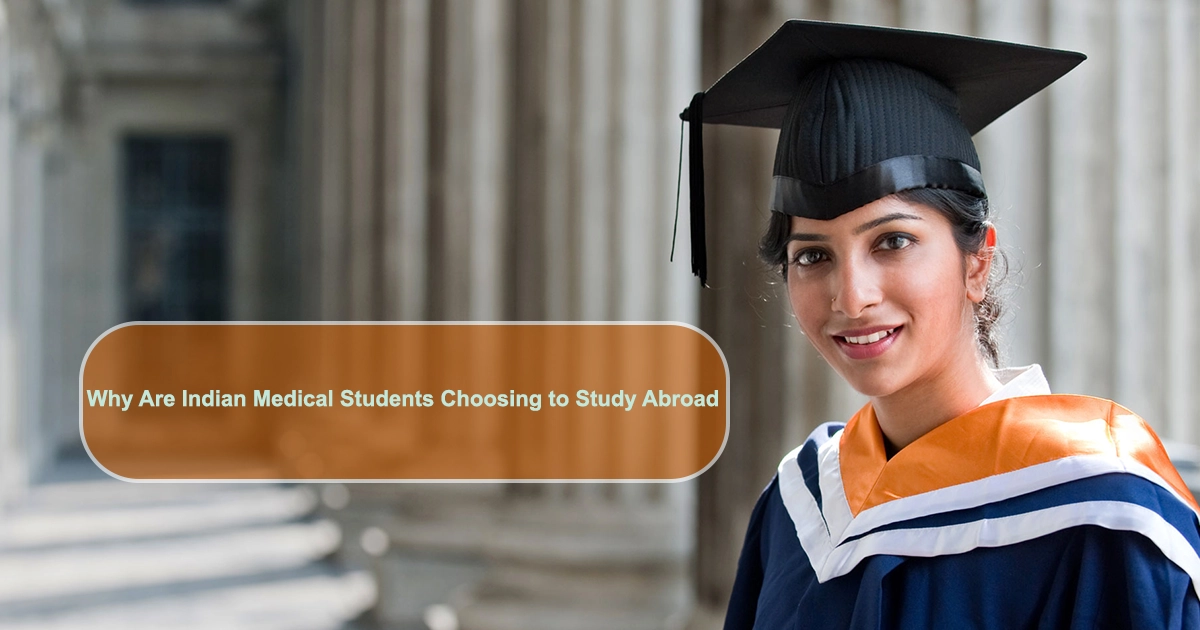
Is It Worth Studying MBBS in China
- 22nd August
- 35

In recent years, a growing number of Indian students have been looking beyond their borders for medical education. Despite the prestige of medical colleges in India, many aspiring doctors are opting to study abroad. This trend raises the question: why are Indian medical students increasingly choosing to pursue their MBBS and other medical degrees overseas? In this blog, we'll explore the key reasons behind this shift.
One of the primary reasons Indian students seek medical education abroad is the intense competition for a limited number of seats in Indian medical colleges. The NEET (National Eligibility cum Entrance Test) is the gateway to medical education in India, and with lakhs of students appearing each year, the competition is fierce. Many talented students are unable to secure a seat in government colleges, where fees are affordable, and they often face exorbitant fees in private institutions.
Studying Abroad: For students who don’t want to compromise on their dream of becoming a doctor, studying abroad presents a viable alternative. Many foreign universities offer high-quality medical education with a less competitive admission process, allowing students to pursue their passion without the stress of intense competition.
Contrary to popular belief, studying medicine abroad can be more affordable than in India, especially when considering private medical colleges. Countries like Russia, Ukraine, China, and the Philippines offer medical programs at significantly lower tuition fees compared to private institutions in India. Additionally, the cost of living in these countries is often lower, making it financially feasible for many Indian families.
Studying Abroad: The affordability factor is a major draw for students and parents alike, as it allows them to obtain a medical degree without incurring massive debts.
While India has some of the best medical institutions in the world, not all students can gain admission to these top colleges. Foreign universities, particularly in countries like the USA, UK, Germany, and Australia, offer world-class education with access to advanced medical technologies and research opportunities. Many of these institutions are globally recognized, which can add significant value to a student’s medical career.
Studying Abroad: Indian students are attracted to the opportunity to study in universities with state-of-the-art facilities, experienced faculty, and cutting-edge research, which can provide a competitive edge in their future careers.
A medical degree from a reputed foreign university is often recognized globally, providing students with the flexibility to practice medicine in multiple countries. This global recognition can be especially advantageous for students who wish to explore career opportunities abroad, whether in the USA, UK, Canada, or other countries with a strong healthcare system.
Studying Abroad: The prospect of a globally recognized degree and the chance to work in different countries are significant motivators for Indian students to study medicine abroad.
Studying medicine abroad not only provides academic knowledge but also offers students the chance to immerse themselves in a new culture. This cultural exposure is invaluable, as it helps students develop a broader understanding of global healthcare practices, patient care, and medical ethics. Additionally, interacting with peers from different backgrounds fosters a more holistic learning experience.
Studying Abroad: The opportunity to gain international exposure, both academically and culturally, makes studying abroad an attractive option for Indian medical students.
The admission criteria for medical education in India are stringent, with high cutoffs and a single entrance exam determining a student’s fate. In contrast, many foreign universities have more flexible admission requirements. While some may require an entrance exam or an English proficiency test like IELTS or TOEFL, others may offer admission based on academic performance in high school.
Studying Abroad: The less rigid admission process abroad provides an alternative pathway for students who may not have excelled in a single exam but still have the potential to succeed in the medical field.
Moving to a new country for education is a life-changing experience that fosters personal growth and independence. For many Indian students, studying abroad is an opportunity to step out of their comfort zone, learn to navigate a new environment, and become more self-reliant. These life skills are crucial for anyone pursuing a career in medicine, where adaptability and resilience are key.
Studying Abroad: The journey of studying abroad helps students grow not just academically but also personally, making them well-rounded individuals.
The decision to study medicine abroad is driven by a combination of factors, including intense competition in India, affordability, access to world-class education, and the allure of global career opportunities. For many Indian students, studying abroad offers a practical and rewarding alternative to pursuing their medical dreams at home. As this trend continues to grow, it’s clear that the global landscape of medical education will play an increasingly important role in shaping the future of healthcare professionals from India.